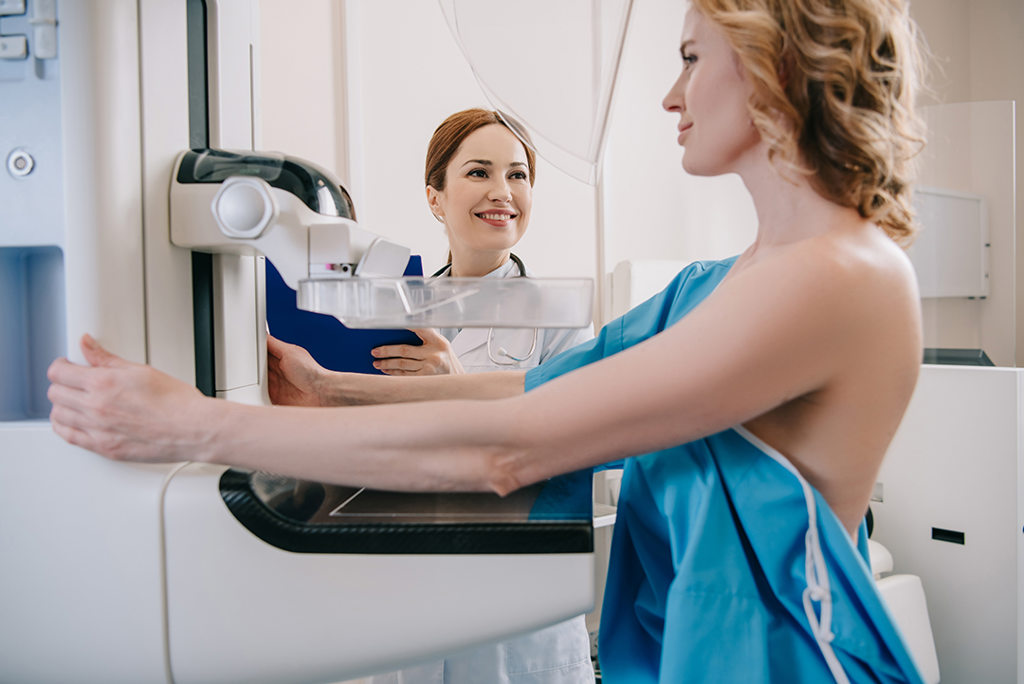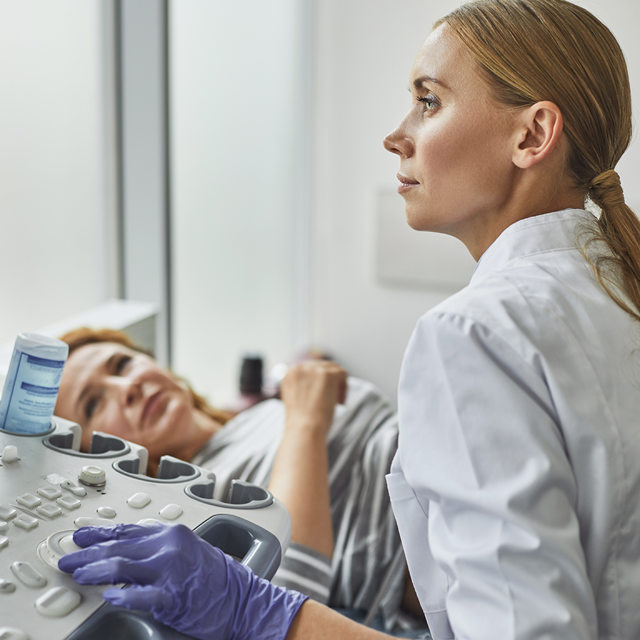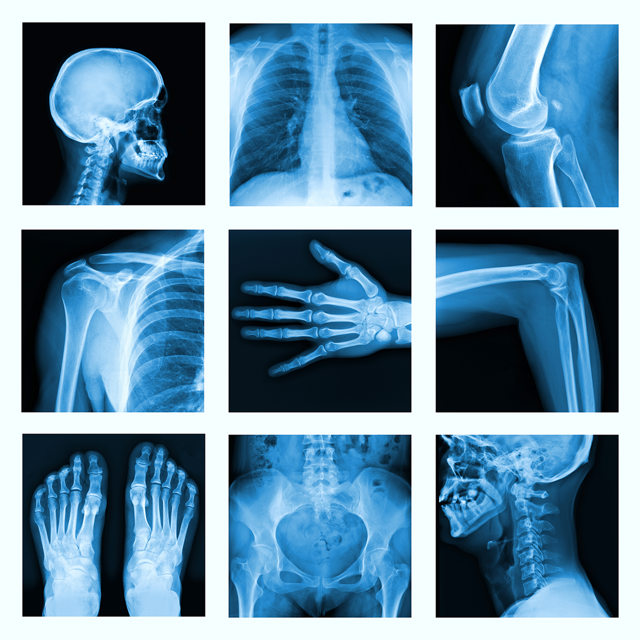
Mammography
Mammography at Penn Highlands Healthcare Helps Detect Breast Cancer Early
Mammography is the first line of defense in the fight against breast cancer. Early detection is the key to beating cancer because when caught early, it’s much more treatable. Our facilities have state-of-the-art mammogram technology in private and comfortable settings. Mammograms are X-ray screenings that check for breast cancer.
3-D Mammography
Tomosynthesis – more commonly called 3-D mammography – is now available. Using the same X-ray technology as traditional 2-D mammography, the procedure feels essentially the same for the patient. The difference is the image clarity for the radiologist who reads the mammogram. Whereas 2-D mammograms give views only from the front and side of the breast, 3-D mammograms provide images of the breast in “slices” from many different angles.
Two-dimensional mammography is still a gold standard and is indicated for routine screenings. It is an excellent tool for detecting breast abnormalities.

Imaging Services at Penn Highlands Brookville offer two-dimensional mammography. Call 814-849-1880 today to schedule your appointment.
Hours:
Monday - Friday
8:00 AM - 4:00 PM
Imaging Services at the Clarion Community Medical Building offer three-dimensional mammography. Call 814-297-8859 today to schedule your appointment.
Hours:
Monday - Saturday
7:30 AM - 4:00 PM
Imaging Services at Penn Highlands Clearfield offers both two-dimensional and three-dimensional mammography. Call 814-768-2276 today to schedule your appointment.
Hours:
Monday & Thursday
8:30 AM - 5:00 PM
Wednesday & Friday
7:00 AM - 3:30 PM
Imaging Services at Penn Highlands Connellsville offer three-dimensional mammography. Call 877-374-7231 today to schedule your appointment.
Hours:
Monday - Friday
8:00 AM - 4:00 PM
Imaging Services at 123 Hospital Avenue offers state-of-the art medical imaging technology for early screening, accurate diagnosis and effective treatment planning.
- Dexa Scans (Bone Density
- Mammography
- Ultrasound Breast
- Stereotactic Breast Biopsy
Imaging Services at Penn Highlands Elk offers two-dimensional and three-dimensional mammography. Call 814-788-8844 today to schedule your appointment.
Hours:
Monday, Tuesday & Wednesday
7:00 AM - 5:00 PM
Thursday 7:00 AM - 6:00 PM
Friday 7:00 AM - 3:00 PM
Saturday By Appointment
The Women's Imaging Center at Penn Highlands Huntingdon offers both two-dimensional and three-dimensional mammography. Call 814-643-8624 today to schedule your appointment.
Hours:
Monday - Friday
8:00 AM - 3:30 PM
Extended Weekday and Saturday By Appointment
Imaging Services at Penn Highlands Mon Valley offers three-dimensional mammography. Call 724-258-1616 today to schedule your appointment.
Hours:
Monday - Friday
8:00 AM - 4:00 PM
Imaging Services at the Moshannon Valley Community Medical Building offer two-dimensional mammography. Call 814-768-2276 today to schedule your appointment.
Hours:
Tuesday
8:00 AM - 4:00 PM
Imaging Services at the Punxsutawney Community Medical Building offer three-dimensional mammography. Call 814-375-4636 today to schedule your appointment.
Hours:
Tuesday and Thursday
8:00 AM - 4:00 PM
OPENING July 30, 2024
Imaging Services at Penn Highlands State College offers two-dimensional and three-dimensional mammography. Call 814-375-4636 today to schedule your appointment.
Hours:
Monday - Friday
7:00 AM - 3:30 PM
Imaging Services at Penn Highlands Tyrone offers two-dimensional and three-dimensional mammography. Call 814-375-4636 or 1-888-920-4636 today to schedule your appointment.
Hours:
Monday - Wednesday - Friday
8:00 AM - 2:00PM
Tuesday - Thursday
8:00 AM - 6:30PM
Imaging Services at Penn Highlands Mon Valley HealthPlex offers three-dimensional mammography. Call 724-379-1900 today to schedule your appointment.
Hours:
Monday - Friday
8:00 AM - 5:00 PM
Breast Cancer Risk Assessments
Penn Highlands Healthcare expanded our commitment to early breast cancer detection with the implementation of software that enhances patient care at all of our imaging sites in Northwestern/Central and Southwestern Pennsylvania.
Our Patient Hub software helps to ensure that every patient receives regular breast screening as well as the follow-up care they may require. It provides an integrated cancer risk assessment questionnaire that collects and stores key patient information to help greater personalize patient care.
In addition, our Scorecard technology objectively measure breast density and assess a woman’s individual risk of breast cancer. By using this technology, radiologists can objectively estimate a woman’s amount of breast density, either from 2D or 3D mammogram images, and help identify those who might benefit from additional screening.
Risk Assessments FAQs
Why a Mammogram?
Mammograms are the most effective tool we have for screening women for breast cancer. They are used to find cancers early, when they are small and easier to treat. Mammograms are also used to assess your breast density. Some women have low breast density while other women have high breast density. Both are common, but mammograms are somewhat less effective at detecting cancer in women with dense breasts. Like dense breast tissue, cancers are white on the mammogram, making it harder for the radiologist to detect.
What is breast density?
Our breasts consist of fat and fibroglandular tissues, which includes the glands and ducts that support breast feeding. Breast density is the amount of fibroglandular tissue compared to your breast size. Breast density is determined from your mammogram and not by the way your breasts feel, or their appearance.
Why is Breast Density important?
Every woman has some amount of breast density. It is important to know your breast density for managing your health, just like knowing your cholesterol score. Having high breast density, like a strong family history of breast cancer, has been linked to higher risk of developing breast cancer.
At Penn Highlands Healthcare, we use Volpara TruDensity™ software to automatically and objectively determine your breast density and provide you more accurate results.
What causes dense breast tissue?
Dense breasts are normal and not caused by illness. All breasts are made of fat, and milk ducts/milk glands held together by fibrous tissue. The glands and fibrous tissue are referred to as “dense tissue.” Each woman’s breasts are different and contain their own mix of fatty and dense tissue. Some women have breasts made of mostly fatty tissue. Some women have a lot of dense tissue. The more glands and fibrous tissue that a woman has, the “denser” her breasts.
Do dense breasts affect my risk of developing breast cancer?
Yes. Dense breast can hide cancer on a mammogram and they increase a woman’s risk of developing breast cancer. Cancers grow more often in dense tissue than fatty tissue. The denser the breast, the higher the breast cancer risk.
Are dense breasts abnormal?
No. dense breasts are normal and common. However, dense breasts increase the risk of developing breast cancer and having cancer missed on a mammogram.
Is breast size related to breast density?
Smaller breasts are more likely to be dense and larger breasts are more likely to be fatty.
What are the four types of breast density?
When you have a 2D or 3D mammogram at Penn Highlands, our radiologist will use our new software to classify your breast density as one of four types:
- Fatty
- Scattered Fibroglandular Densities
- Heterogeneously Dense
- Extremely Dense
What happens if I have dense breasts?
If our assessment tool indicates dense breasts, your physician may recommend additional screening tests such as an MRI or ultrasound. It is important to note that mammograms sometimes show some cancers that an ultrasound or MRI may not. The combination of tests find the most cancers.
Will my breasts always be dense?
Breast density can change during different stages of a woman’s life. Dense breasts are more often found in women who are younger, pregnant or breastfeeding, are taking hormone replacement therapy or among those who have a lower body weight.
Can I lower my breast density?
There are not any guidelines or suggestions on how women can lower breast density.
Do men have dense breasts?
No. Normal male breasts do not contain dense tissue.
Is breast density hereditary?
If your mother or sister have dense breasts, it is more likely that you will too.
Additional Diagnostic Services For Women At Penn Highlands
Breast Ultrasound
If something shows up on a mammogram that doesn’t look right, what are the next steps? There are two possibilities – breast ultrasound or MRI.
Stereotactic Breast Biopsies
If a mammogram or clinical breast exam does detect a lump in your breast, you’re in good hands at Penn Highlands Healthcare. We offer stereotactic breast biopsies, where a doctor removes a small sample of breast tissue to examine it for breast cancer or other problems. Our experts also perform ultrasound-guided breast biopsies, where a doctor uses ultrasound imaging to pinpoint the exact tissue to be removed for examination.
Bone Density (DEXA) Scans
Penn Highlands also offers DEXA scans, which use an enhanced form of X-ray technology to determine bone density to help diagnose osteoporosis.





